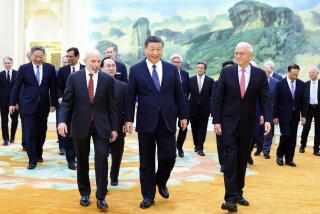Foreign Firms Wary of China, Says Official
- Share via
BEIJING — The June 3-4 martial law crackdown against pro-democracy protests in Beijing has left foreign businesses facing “a fundamentally changed situation” in China, according to Roger W. Sullivan, president of the U.S.-China Business Council.
From the autumn of 1986, when Beijing stepped up its efforts to create more favorable conditions for foreign investment, right up until the June crackdown, foreigners in China could see steady progress in the creation of a better business environment, Sullivan said in a weekend interview. This included steps forward in areas such as reduced bureaucratic interference, a more workable legal structure and the availability of necessary financial services.
Chinese officials insist that reform is still on track, making comments such as “nothing’s changed that much,” said Sullivan, who met with Vice Premier Tian Jiyun and with Zheng Tuobin, minister of foreign economic relations and trade.
“But what people were looking at was the fact that with every passing month, the situation here seemed to get better. So people were straight-lining that out and assuming that five years from now it’s going to be a lot better,” he explained. “Now you’ve just cut that confidence out from under them. . . . There isn’t any trend line. We don’t know where it’s going.”
Chinese leaders, including Communist Party General Secretary Jiang Zemin, who was appointed in late June to replace reformist former General Secretary Zhao Ziyang, have repeatedly stressed that China intends to continue its policies of reform and openness to the outside world, Sullivan pointed out. But the same leaders have also used harsh rhetoric criticizing capitalism and Western countries, he added.
The council that Sullivan heads is an association of American companies involved in trade or investment in China. Within China, he is viewed as a spokesman for U.S. businesses.
“I made the point in every one of the meetings that (foreign business) people just aren’t reassured by the statements of what the policy is, because they’re confused by the mixed rhetoric,” Sullivan said. “It just doesn’t strike foreign companies as being a stable environment in the sense of policy.”
Sullivan also said that foreign business confidence in China will depend on forward movement in its economic restructuring and especially in the creation of a better investment environment.
“They say, ‘We’re going to maintain all these (reform-oriented) regulations and policies in place,”’ he said. “That’s just not good enough. The point is, (before June) it was improving and it was going to continue to improve.”
Sullivan said one hopeful sign that he found was that the high officials he met seemed to recognize the need to back up verbal commitments to reform with concrete measures.
Tian and Zheng seemed to show “real concern about a deterioration in their relationship with the United States, and the deterioration of their economy resulting from deterioration of the relationship with the United States,” he said.
Sullivan said the types of steps that China could take to reassure foreigners would be things like making credit more easily available to joint ventures, or passing new reform-oriented legislation. He cited as examples such long-discussed measures as a law protecting intellectual property rights and a law that would allow foreigners to serve as chairmen of boards for joint ventures.
Sullivan expressed disappointment, however, in General Secretary Jiang’s first major policy address, which was delivered Friday as part of celebrations honoring the 40th anniversary of the founding of the People’s Republic of China.
“What bothers me is his attitude toward reform,” Sullivan said. “The best you can say about it is that he’s trying to define a policy of openness to the outside world without reform. I don’t think that’s possible.”
Sullivan said he was particularly disturbed by references in Jiang’s speech to new restrictions on collective and private enterprises.
Chinese officials, explaining a growing move to dismantle some of these small but dynamic enterprises, insist “that they’re only being shut down because they’re inefficient and waste raw materials,” Sullivan pointed out. But it seems that they are actually being shut down because they compete too successfully with large but poorly run state enterprises, he said.
Sullivan said he felt that Jiang’s statements were “almost Orwellian,” adding, “He’s supposed to be the moderate! It doesn’t look very encouraging.”
More to Read
Inside the business of entertainment
The Wide Shot brings you news, analysis and insights on everything from streaming wars to production — and what it all means for the future.
You may occasionally receive promotional content from the Los Angeles Times.










